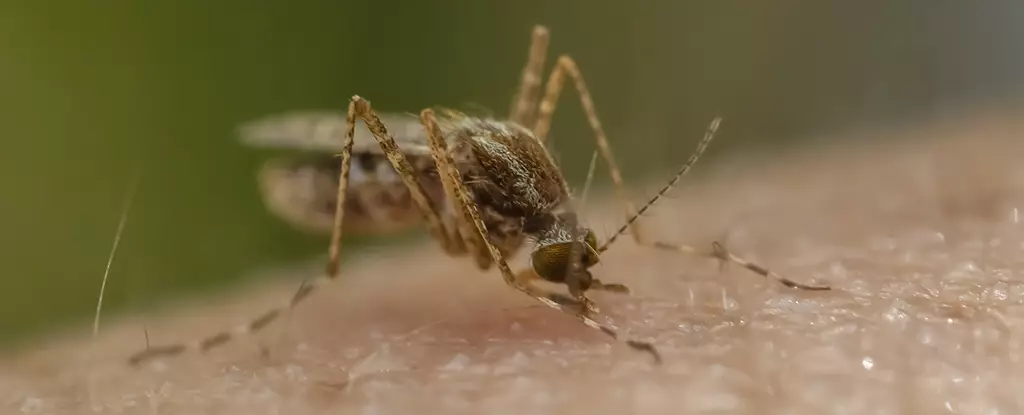Malaria remains one of the most formidable public health challenges worldwide, with millions of infections and numerous fatalities reported annually. Traditionally, mosquitoes have been infamous for spreading this debilitating disease, but recent research from the Netherlands presents an exciting paradigm shift: mosquitoes may actually play a role in delivering a groundbreaking malaria vaccine. This development opens up possibilities for significantly enhancing malaria prevention strategies.
Researchers at Leiden University and Radboud University have unveiled a novel vaccine against malaria, identified as the GA2 variant. What sets this vaccine apart from its predecessors is its method of inducing immunity through a genetically modified version of the Plasmodium falciparum parasite, responsible for the majority of malaria cases. Unlike traditional vaccination strategies, which often rely on killed or weakened pathogens, GA2 employs a “crippled” form of the parasite that cannot mature sufficiently to cause illness. This innovative approach appears to trigger a robust immune response without inflicting the symptoms usually associated with malaria.
Clinical assessments reveal that of the young adults who received this new vaccine, a remarkable eight out of nine exhibited immunity to malaria. In stark contrast, only one of eight individuals vaccinated with the conventional product showed similar protection. Such promising results suggest that GA2 has the potential to significantly outpace existing vaccines, which generally offer only partial immunity.
The logic underpinning the GA2 vaccination hinges on its unique delivery mechanism. When introduced via a mosquito bite, the genetically modified parasite mirrors the natural infection process, which is crucial for eliciting an immune response. However, the GA2 variant takes approximately one week to develop within the liver—much longer than the rapid 24-hour maturation of the previous vaccine, GA1. This delay allows the immune system time to identify and combat the approaching threat, thus improving the durability and comprehensiveness of the immune response.
Research indicates that the GA2 vaccine engenders a wider and more diverse array of immune cells compared to earlier versions. The induction of a broader immune response could prove essential for long-term protection against malaria, a disease that has historically evaded full eradication efforts due to its adaptability and resilience.
As with any vaccine, safety is of paramount importance. Preliminary trials of the GA2 vaccine have shown relatively mild side effects, mainly limited to localized irritation—redness and itchiness—at the site of the mosquito bites. This would suggest that delivering the vaccine through a natural vector carries minimal risk, at least in the early stages of testing. Following the completion of these studies, participants were prescribed anti-malaria medication as a precaution, underscoring the researchers’ commitment to participant safety.
Despite the promise demonstrated by the GA2 vaccine, it is essential to remain grounded in reality. Globally, there are still around 250 million malaria infections each year, resulting in hundreds of thousands of deaths. Current vaccines typically provide only partial immunity—between 50% and 77%—and often lose efficacy within a year. Thus, while the GA2 vaccine marks a significant advancement, the challenge of widespread implementation remains daunting.
One notable hurdle in the path to effective vaccine rollout is the method of delivery. Although the mosquito bite mechanism proves useful for research and could potentially offer an innovative delivery method, it raises practical concerns regarding public health applications. Employing modified mosquitoes for mass vaccination is fraught with complexities and ethical considerations. Scalability and public acceptance of such a method necessitate thorough exploration before it can be adopted widely.
Despite these challenges, the researchers’ enthusiasm for the potential of the GA2 vaccine is palpable. Clinical microbiologist Matthew McCall’s assertion that the vaccine performs “very well” highlights both the promise of this research and the hopeful trajectory it heralds for malaria prevention. The findings from this study may pave the way for further exploration and refinement of malaria vaccines, as scientists seek to understands the intricate mechanisms that enable a stronger immune defense.
While malaria continues to pose a significant threat, the emergence of innovative vaccination strategies—especially one that employs genetically modified mosquitoes—ushers in a hopeful chapter in the quest for effective prevention. The evolution of the GA2 vaccine signifies a vital step forward but illustrates that there is still much work to be done to outsmart a disease that has affected humanity for centuries.

Leave a Reply